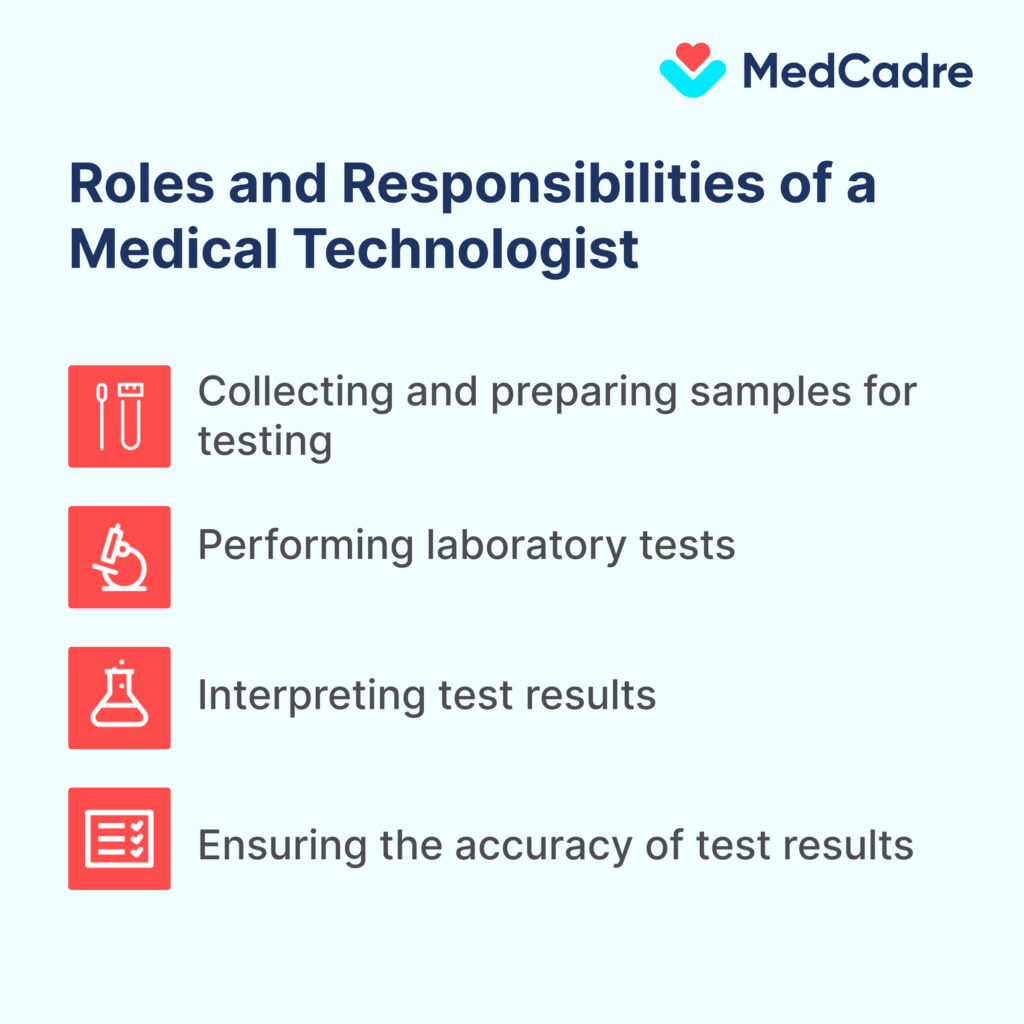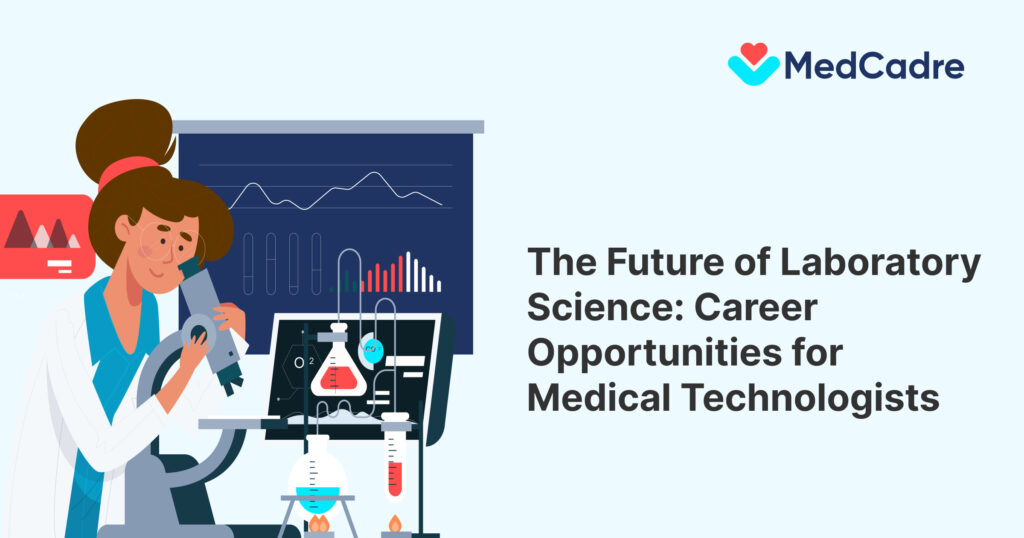The future of laboratory science is bright and full of exciting opportunities for medical technologist. As technology advances, the laboratory science field is evolving rapidly to keep pace. There is a growing demand for skilled laboratory technicians who can adapt to new technologies and methodologies.
What is Medical Technologist Career – Qualifications & Skills
A medical technologist, also known as a clinical laboratory scientist or medical laboratory scientist, is a healthcare professional who performs a wide range of laboratory tests to diagnose and treat diseases. They work in hospitals, clinics, and other healthcare settings and play a critical role in ensuring the accuracy of patient test results.
Medical technologists typically have a bachelor’s degree in medical technology or a related field and must also complete a clinical internship. They must be able to work independently and as part of a team and have strong attention to detail and problem-solving skills.
Qualifications of a Medical Technologist –
Medical technologists or medical laboratory technicians need educational qualifications to meet the criteria to become a professional.
Educational Qualifications:
- Bachelor’s Degree: A bachelor’s degree in medical technology or a related field, such as biology, chemistry, or microbiology, is required.
- Clinical Internship: Upon completing your bachelor’s degree, you must complete a clinical internship program. This program typically lasts one year and provides you with hands-on experience in a clinical laboratory setting.
Experience Requirements:
- Entry-level: Entry-level medical technologists typically have one to two years of experience.
- Mid-level: Mid-level medical technologists typically have three to five years of experience.
- Senior-level: Senior-level medical technologists typically have five or more years of experience.
Additional Qualifications –
- Certification: Certification from the American Society for Clinical Pathology (ASCP) is highly recommended. Certification demonstrates that you have met the ASCP’s standards for competence and knowledge in laboratory medicine.
- Licensure: Some states require medical technologists to be licensed. Check with the state licensing board in your state to determine if a license is required.
Skills and Abilities:
- Analytical skills: Medical technologists must be able to analyze data and interpret test results.
- Attention to detail: Medical technologists must be able to pay close attention to detail to ensure the accuracy of test results.
- Problem-solving skills: Medical technologists must be able to troubleshoot problems and identify sources of error.
- Communication skills: Medical technologists must communicate effectively with other healthcare professionals.
- Teamwork skills: Medical technologists must work effectively as part of a team.
What are the Job Roles and Responsibilities of a Medical Technologist?
The position is technology-driven, and the responsibilities will be major if you are associated with reputed hospitals or clinics. Besides, the higher your skill in managing a responsible position, the higher your compensation will be.
Here are some common duties you need to perform in your organization –

- Collecting and preparing samples for testing: The duty involves drawing blood, collecting urine or stool samples, or preparing tissue samples for examination.
- Performing laboratory tests: This may involve using various equipment and techniques to analyze samples, such as microscopes, spectrophotometers, and automated analyzers.
- Interpreting test results: Medical technologists must be able to interpret the results of laboratory tests and communicate them to healthcare providers.
- Ensuring the accuracy of test results: Medical technologists must follow strict quality control procedures to ensure that the results of laboratory tests are accurate.
What are the Career Benefits Medical Technologists Get?
In the US, the career benefits are high as the Healthcare sector stays ahead of other sectors. The following benefits keep you ahead in this competitive era –

1. High Job Security and Demand:
Medical technologists are in high demand across the healthcare industry, ensuring stable employment opportunities. The Bureau of Labor Statistics projects that employment of medical and clinical laboratory technologists will grow 9% from 2020 to 2030, much faster than the average for all occupations.
The growth is driven by the increasing complexity of medical testing and the aging population, which requires more sophisticated diagnostic procedures.
2. Competitive Salary and Earning Potential:
Medical technologists earn a competitive salary, with a median annual wage of $75,300 in 2020. It is higher than the median annual wage for all occupations, which was $41,950 in 2020. Experienced medical technologists, those with specialized certifications, and those working in certain settings can earn even more.
3. Variety and Specialization:
The medical technology field offers various specializations, allowing individuals to pursue areas that align with their interests and expertise. Some common specializations include clinical chemistry, hematology, microbiology, and molecular diagnostics. Each specialization focuses on specific types of tests and diagnostic procedures.
4. Making a Difference in Patient Care:
Medical technologists play a crucial role in patient care by providing accurate and timely test results that inform treatment decisions. Their work directly impacts patient diagnosis, monitoring, and treatment outcomes.
5. Opportunities for Advancement and Continued Learning:
Medical technologists have opportunities for advancement within their profession. They can gain experience, acquire specialized certifications, and take supervisory or management roles. Additionally, the field of medical technology is constantly evolving, providing opportunities for continued learning and professional development.
6. Work-Life Balance and Job Flexibility:
Medical technologists often enjoy a good work-life balance, with regular hours and possible shift work. It can allow for a healthier balance between work and personal commitments.
7. Job Satisfaction and Personal Fulfillment:
Medical technologists often report high levels of job satisfaction, stemming from the meaningful nature of their work and its impact on patient care. They find fulfillment in contributing to the healthcare system and helping others.
8. Transferable Skills and Versatility:
The skills and knowledge gained as a medical technologist are transferable to other healthcare settings and research environments. This versatility provides options for career exploration and growth.
9. Contribution to Scientific Advancements:
Medical technologists are at the forefront of scientific advancements in laboratory medicine. They play a role in developing new diagnostic tests, refining existing procedures, and contributing to the overall progress of medical science.
How to Become a Medical Technologist?
To become a Medical Technologist, you must align your education with the requirements. The challenging field is technology-driven, and you must know how to run the software and other tools to get accurate results, manage the patients, and organize the data on behalf of your organization.
Below are the steps to follow to become a Medical Technologist –
Earn a Relevant Degree – To become a Medical Technologist, you must have a Bachelor’s degree in medical science. Lab technicians must know about technology and automation and understand the emergence of the task they’re performing.
Enroll for a Clinical Internship – Clinical internships for medical technologists in the US offer a diverse range of experiences and opportunities to gain hands-on training in different laboratory settings. These internships typically last one year and are designed to provide aspiring medical technologists with the practical skills and knowledge necessary to excel in their careers.
Some of the clinical Internship helpful to become a Medical Technologist in the US are:
- Hospital-based Internship
- Speciality focused Internship
- Public Health Laboratory Internship
- Research Laboratory Internship
- Clinical Outreach Laboratory Internship
Choosing the right clinical Internship depends on individual interests, career goals, and preferences. When selecting an internship program, aspiring lab technicians should carefully consider their areas of interest, desired work environment, and potential career paths.
How Do You Find a Job as a Medical Technologist in the US?
Finding a job as a medical technologist in the US requires a combination of education, experience, and strategic job search techniques.
Here are some of the strategies you can adopt to get a desired job –
Step 1: Craft an Effective Resume and Cover Letter
Tailor your Resume to each job application, highlighting relevant skills, experiences, and certifications that align with the specific requirements. Write a persuasive cover letter that showcases your passion for the field, enthusiasm for the role, and suitability for the organization’s culture.
Step 2: Leverage Online Job Boards and Networking
Utilize popular job boards like Indeed, Monster, Glassdoor, and LinkedIn to search for relevant medical technologist positions. Attend industry events, connect with professionals on LinkedIn, and network with healthcare providers to expand your professional circle and uncover potential job opportunities.
Step 3: Target Specific Employers and Locations
Research potential employers, their values, and the specific requirements of the positions you’re applying for. Prioritize job applications in locations that align with your lifestyle preferences and career goals.
Step 4: Utilize Specialized Resources and Support
Utilize the ASCP Career Center for job listings, career planning resources, and mentorship opportunities. Check the websites of hospitals and clinics in your desired locations for job openings. Join professional organizations like the American Society of Clinical Laboratory Scientists (ASCLS) for networking and career development opportunities.
What is the Other Way to Get a Job as a Medical Technologist?
You can rely on the MedCadre platform designed to provide jobs to aspiring candidates in the healthcare industry. MedCadre, one of the leading job-providing platforms for job seekers in the US, offers the best resources in the industry.
We take care of the submitted CVs, verify all the details, and place them in the relevant healthcare sections.
How MedCadre Helps in Securing the Job?
You might raise a question about how the platform works. We have 500+ dedicated team members actively engaged in the famous job portals to find you the best healthcare career.
We are a compliant-based platform that manages all the government guidelines to pass through your profiles and verify each data before you get the offer letter.
The Benefits You Will Get if You Collaborate with Us –
You will get various benefits from MedCadre, including –
- PPO Health insurance, optional dental, vision, and life insurance
- You can join our 401K Plan
- Travel expenses and per-diem benefits are also available
- You can select the job type – contract, long-term, and short-term
- You can avail of the Basic life insurance offered by the company, which hires you for extended coverage
How to Join Us?
You need to follow the steps to join us and avail of our service.
1: Visit our web page : https://medcadre.com/
2: Fill the form with your information and
3: Once you submit the form, our team will verify your CV and shortlist
4: Soon, you will receive a call from our executives
In Conclusion
The job search process takes time, persistence, and dedication. Medical technologists play a vital role in the healthcare system, and their work is essential for diagnosing diseases, monitoring patients’ progress, and developing new treatments.
They are highly skilled professionals who must be able to work independently and as part of a team and have strong attention to detail and problem-solving skills. If you want a hassle-free job landing, contact us with your updated resume, and we will handle it.


